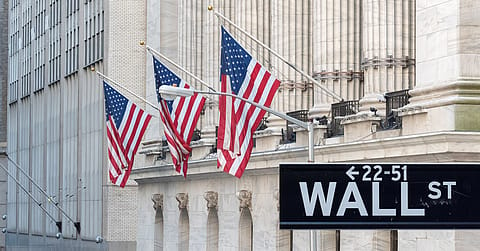U.S. stocks slump up to 4% on Trump’s recession remark; Tesla shares skid 12%
Reacting to Trump’s recession remark, Nasdaq Composite dropped as much as 3.9%, while the Dow Jones Industrial Average and the S&P 500 index fell up to 2.5%.

U.S. equity markets witnessed sharp selling on Monday, extending the previous week’s sell-off, amid persistent concerns that President Donald Trump’s tariff policies could impact economic growth. The sell-off intensified after Trump said the U.S. economy would see short-term turbulence from his trade and fiscal agenda and refused to rule out a recession. “I hate to predict things like that. There is a period of transition because what we’re doing is very big,” Trump said in a Sunday Morning Futures interview on Fox News.
Reacting to Trump’s recession remark, all three major U.S. indices opened lower by 1% today, led by tech-heavyweight Nasdaq Composite. Extending opening losses, the Nasdaq dropped as much as 3.9%, or 705 points, while the Dow Jones Industrial Average lost 595 points, or 1.4%. The S&P 500 index fell 137 points, or 2.4%.
The U.S. stocks witnessed broad-based selling, with “Magnificent Seven” of tech shares — Google parent Alphabet, Amazon, Apple, Facebook’s parent Meta, Microsoft, Nvidia, and Tesla all slipping in red. Elon Musk-led Tesla shares plunged up to 12% in intraday trade, while AI chipmaker Nvidia declined 5%.
Nasdaq Composite nosedives 11% in a month amid trade conflict fears
In the last one month, the Nasdaq Composite has fallen over 11% amid fears of a global trade conflict, while investors awaited further signals to gauge the U.S. Federal Reserve's interest rate stance. On the other hand, the Dow Jones and the S&P 500 index fell in the range of 5-7%.
Last week, President Trump threatened to impose large import taxes on Canada, Mexico, and China, the U.S.'s top trading partners, which according to economist could increase inflation and slow economic growth. However, he suspended some of the implementation of tariffs on Canada and Mexico until April, but his due date for reciprocal tariffs, April 2, is approaching.
In an address to Congress, Trump recently said further tariffs would follow on April 2, including "reciprocal tariffs" and non-tariff actions aimed at balancing out years of trade imbalances. This follows new 25% tariffs on imports from Mexico and Canada, along with a doubling of duties on Chinese goods to 20%.
According to Royal bank of Canada, U.S. inflation could increase by 50 basis points by year-end if tariffs are enforced beyond 3 months, expecting inflation to remain over 3%.
Recently, Federal Reserve Chair Jerome Powell also acknowledged uncertainty about the Trump administration's tariff plans but seemed upbeat about economic growth. The rise in inflation could delay rate cut by the U.S. central bank.
(DISCLAIMER: The views and opinions expressed by investment experts on fortuneindia.com are either their own or of their organisations, but not necessarily that of fortuneindia.com and its editorial team. Readers are advised to consult certified experts before taking investment decisions.)